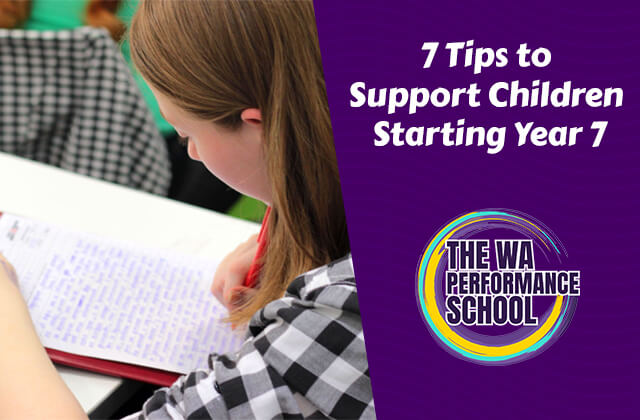7 Tips to Support Children Starting Year 7

Starting year 7 is an important milestone for tweens, but it doesn’t have to be daunting, for students or for parents. By setting up good habits early, and working together to find a routine that works, the transition from primary to high school can be smooth and even enjoyable! We’ve talked with parents, students and teachers to discover the 7 top tips for supporting students as they enter year 7. Read on to find out how you can support your child’s transition to high school without their social, recreational, or study time having to suffer:

1. Participate in school orientation activities
Many public and independent schools offer various orientation days, meet-the-teacher events, BBQs, camps, and other activities. While they may mean taking some time off work, or a small extra fee, they are great way to become part of the school community! These not only build familiarity with classmates, staff and school venues, but they show students (and parents) that starting high school doesn’t have to be overwhelming or confusing. Get to know the pastoral care team that will care for your child for the next six years and you’ll be amazed at the resources available to support you and your family.

2. Extracurricular activities
It’s important to teach your child commitment and not to give up on responsibilities when things get tough; it’s a lesson that will stick with them long into adulthood. It may feel like cutting out activities outside of school hours is the best way to help prepare for year 7, but this often leaves tweens with no structured activities to blow off steam outside of school time, which can be frustrating! With all the extra homework and responsibilities, it’s important for kids to remember there’s life outside of the classroom too. Extracurricular activities are a great way for children to continue to learn important life, social, and educational skills, in a fun and supervised environment – much better than just hanging out at the local shopping centre after school! At WAPS we see our young teenagers bond every week in music, dance and drama classes, unlocking confidence, creativity, spatial awareness, positive body image, social skills, academic achievements and so much more. We’re often lucky enough to see how these skills continue to benefit teens as they grow into strong young adults too!

3. Work together to plan after school hours
Don’t forget, your child is still learning time management! Primary school students may not have had much opportunity to be in charge of how they divide their own time in the past, so new year 7s often need parental help to design a sensible after school schedule. Rather than giving all their time to either homework or ‘down time’, work together to test (and revise) a schedule that is realistic and balances responsibilities with recreation. Most schools recommend year 7s undertake 30 mins to an hour of homework or study a night, and we’ll be honest – a lot of year 7s don’t manage even that! Having a structured schedule that allows time for study, music or dance practice, light exercise, and of course relaxation and socialising will show children that YES, they CAN fit it all in! This means less stress when coming up to tests or deadlines, and an organised and balanced adolescence – a great way to create responsible young adults.

4. Help your child create their dream study area
Now that your child is going to be receiving more homework they will need a distraction free space to complete it. Letting your child choose a few fashionable stationery items and have some input on designing the space, can really help them feel happy and comfortable when studying. An area that is private but is still accessible to family members if tweens need homework help is ideal. Growing tweens often respond well to the coolest new gadgets and trends, like cute succulents, pinboards, and stylish planners or apps to help organise homework and assignments. Having some input and responsibility for their study space will give a sense of ownership and pride when using it. We also highly recommend including a weekly planner or homework journal to help them stay on top of things – if your school doesn’t provide one, tweens can grab their favourites from Typo or Smiggle! Did you know WAPS has a FREE homework journal available to help your kids stay on top of their music and dance practice too? Check it out here.

5. Give tweens some responsibility
Whilst your instinct may be to cut down on responsibilities to avoid contributing to stress or cutting into homework time, the opposite may actually be beneficial! Being in charge of certain tasks, whether just to help the family, or in return for an allowance is a great way to encourage responsibility, a feeling of contribution/value, and an understanding of how their actions can have positive consequences for themselves and others. Whether you continue the same chores from year 6 or add extra responsibilities, your year 7 child will reap the long-term benefits. Tweens can help with household tasks like dishes, vacuuming, emptying rubbish, but also higher-level tasks like helping create a shopping list for the week, caring for siblings or pets, and even helping with meal preparation and cooking. Not only will they feel like they’re contributing to the family but they will learn about budgeting, nutrition, caring for others, and even have the chance to chat with parents and family members about what’s happening in their lives so you can stay connected to your growing child! (While you ask yourself: how does it happen so fast?)

6. Support reading!
It’s ironic that a generation who can be so glued to their screens would need to increase their reading time, but it’s true. Whether it’s a young adult novel, graphic novel, or even a non-fiction biography or textbook, there’s a book for every child which will help to broaden their mind! Try leading by example by switching off the TV and phone and spending a rainy afternoon reading together with a cup of tea, and you’ll soon feel the benefits yourself (don’t we all have that pile of books we plan to read ‘one day’?). Showing teens that there are other activities to be enjoyed during leisure time will expand their horizons and ensure their literacy and awareness of the world around them is on par with high school expectations. The added benefit is that your child’s reading at school will improve too – critical analysis of texts is required in most school subjects. Recreational reading means that being asked to read an entire novel for English class is no longer such a stress!

7. Support socialisation and self-confidence
Having after school activities where children are meeting different people and making friends outside of school is vital for new year 7 students. Many parents mention the increased cohort size of high schools can throw up new social challenges for their children. With many year 7s at different developmental levels, conflicts between students can occur, and with the advent of social media, kids no longer have the luxury of leaving social troubles at the school gate. It’s important to support your child as they encounter new problems and have to learn new forms of conflict resolution and dealing with others (we all know this will help them one day in the workplace too!). Having friends outside of the schoolyard reminds children that friendships can exist everywhere, and that high school is not the be all and end all of socialising. Escaping the fishbowl and finding a unique and supportive friendship group can make all the difference to a child’s confidence and outlook on the world. A drama in the schoolyard may pale into (relative) insignificance when children are reminded that there are plenty of friends who love them outside of school too. Sometimes it can be difficult to ‘let go’ and allow your child to socialise with friends whose parents you may not know as closely as their primary school friends’ parents. Why not schedule in one-on-one time with your child to talk about their new friends and get to know them – if there’s a good book and a cup of tea involved, that won’t hurt either!
Want more tips for students entering year 7, or is there something else you want to see on the WAPS blog? Contact us to suggest or request a topic!

























 Studio: 3 Price Street, SUBIACO WA 6008
Studio: 3 Price Street, SUBIACO WA 6008


